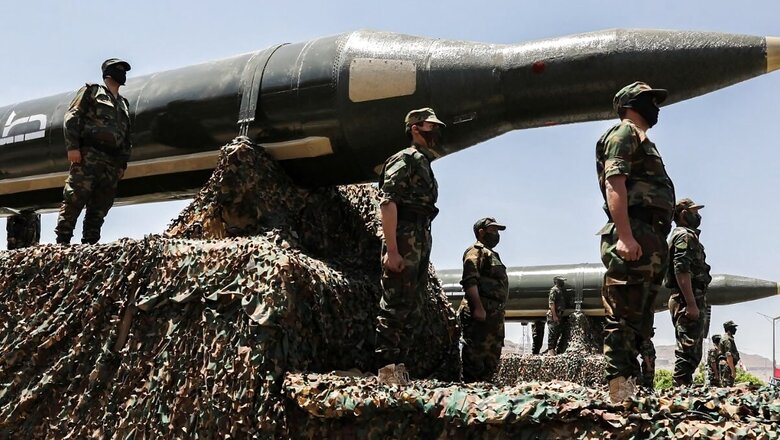
views
Iran has brokered ongoing secret talks between Russia and Yemen’s Houthi rebels to transfer anti-ship missiles to the militant group, three Western and regional sources said, a development that highlights Tehran’s deepening ties to Moscow.
Seven sources said that Russia has yet to decide to transfer the Yakhont missiles – also known as P-800 Oniks – which experts said would allow the militant group to more accurately strike commercial vessels in the Red Sea and increase the threat to the US and European warships defending them.
The Wall Street Journal reported in July that Russia was considering sending the missiles. Iran’s role as an intermediary has not been previously reported.
The Houthis have launched repeated drone and missile strikes on ships in the crucial Red Sea shipping channels since November to show support for Palestinians in the Gaza war with Israel.
They have sunk at least two vessels and seized another, disrupting global maritime trade by forcing shipping firms to divert cargos and, according to industry sources, driven up insurance costs for ships plying the Red Sea.
In response, the United States and Britain have struck Houthi positions but have failed to stop the group’s attacks.
Two regional officials aware of the talks said that the Houthis and Russians met in Tehran at least twice this year and that the talks to provide dozens of the missiles, which have a range of about 300 km (186 miles), were ongoing with further Tehran meetings expected in coming weeks.
Russia has previously supplied the Yakhont missile to Iran-backed Hezbollah.
One of the sources said the talks started under Iranian President Ebrahim Raisi, who died in a helicopter crash in May.
“Russia is negotiating with the Houthis for the transfer of Yakhont supersonic anti-ship missiles,” said a Western intelligence source. “The Iranians are brokering the talks but do not want to have their signature over it.”
Neither Iran’s US mission nor the Russian Defense Ministry responded to requests for comment.
“We have no knowledge of what you have mentioned,” said Mohamed Abdel-Salam, the official spokesman for Yemen’s Houthis.
A senior US official declined to name the specific systems that could be transferred but confirmed that Russia has been discussing supplying missiles to the Houthis, calling the development “very worrisome.”
A US Defense Department official said any efforts to bolster the Houthis’ capabilities would “undermine the shared international interest in global freedom of navigation and stability in the Red Sea and broader Middle East.”
CLOSER RUSSIA-IRAN LINKS
Russia and Iran have been nurturing closer military ties amid Russia’s war in Ukraine. Tehran has allegedly transferred ballistic missiles to Moscow for use against Ukraine, the United States said earlier this month.
One motivation for Moscow to arm the Houthis, three sources said, is the possibility that Western states could decide to allow Ukraine to use their weapons to strike farther into Russian territory.
The senior US official said the Russia-Houthi talks “seem to be related to our posture in Ukraine and what we’re willing or not willing to do” regarding Kyiv’s requests for the lifting of restrictions on its use of long-range US-supplied weapons to strike targets deep inside Russia.
Russian President Vladimir Putin warned in June that Moscow could send advanced long-range weapons – similar to those the United States and its allies give Ukraine – to the West’s adversaries around the world.
The Yakhont is considered one of the world’s most advanced anti-ship missiles, designed to skim the sea’s surface to avoid detection at more than twice the speed of sound, making it difficult to intercept.
‘GAME CHANGER’ FOR REGIONAL SECURITY
Fabian Hinz, an expert on ballistic missiles with the International Institute for Strategic Studies, said that the transfer of Yakhont missiles by Russia to the Houthis would be a “game changer” for regional security.
“The P-800 is a far more capable system than the anti-ship ballistic and cruise missiles the Houthis have used so far,” said Hinz.
Not only could the Houthis fire them at US, British and other warships that have been protecting commercial vessels in the Red Sea from Houthi drone and missile attacks, but they can be used as land-attack weapons that Saudi Arabia would see as a threat, Hinz said.
The senior US official said that a delegation of US officials discussed the Russia-Houthi negotiations with their Saudi counterparts during a visit to Saudi Arabia this summer, and that Washington has raised the issue with Moscow.
The Saudis have also conveyed their concerns directly to the Russians, three sources told Reuters.
The Saudi government did not respond to a request for comment.
Hinz said Russia would need to help with the technical aspects of a missile delivery, including how to transfer and make them operational without the United States detecting and destroying the weapons. The Houthis would also need training on the system.
The senior US official warned of dire consequences if the transfer takes place.
“The Saudis are alarmed. We are alarmed, and other regional partners are alarmed,” the official said. “The Houthis are already creating enough damage in the Red Sea, and this would enable them to do more.”




















Comments
0 comment